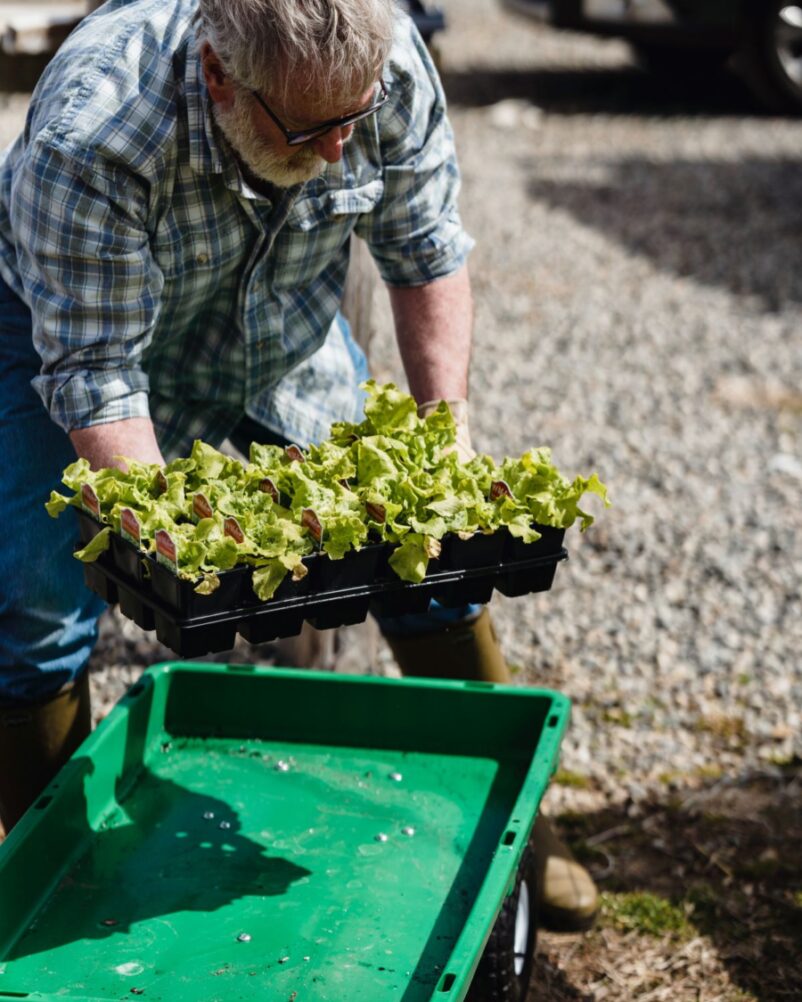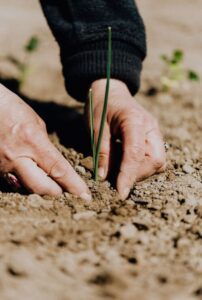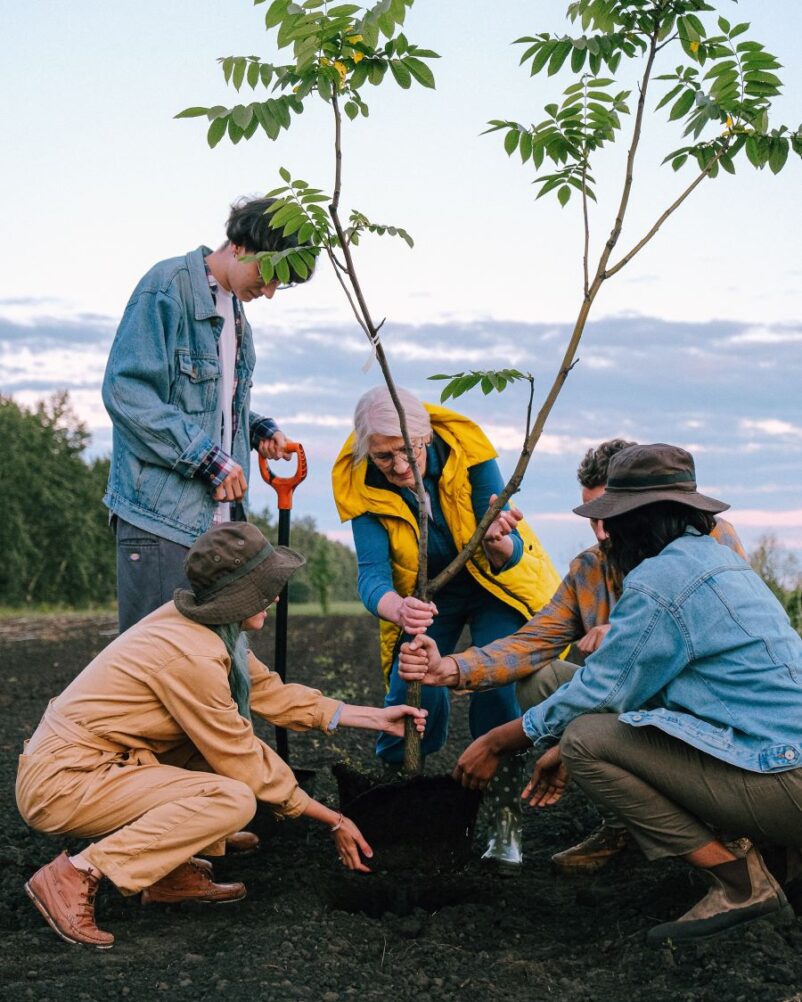
I’ve always had a love-hate relationship with gardening. For starters, the competition in my family has been nothing short of fierce. My maternal grandmother had the green thumb, which carried over to my mom and her siblings as well. My mother-in-law shared the same passion as well, with a nice-sized vegetable garden she tended to.
Growing up, my mother tried to instill a love of gardening in me, but I was pretty nonchalant about it all. I don’t know how or when it changed, but I’ve slowly sprouted a green thumb and a mini passion about landscape gardening and having beautiful potted plants. While I still don’t draw the “oohs and aahs” like the plants grown by my aunt or the roses my mother once adored, I’m getting there. Baby steps.
Apparently, I’m not alone either. For many individuals of any age, a love of gardening is more than just a hobby – it’s a beloved activity that brings numerous benefits to their overall well-being. But there seems to be something a little bit more special about gardening when you are age 50-plus. But, why?
First, a love of gardening provides individuals with a sense of purpose and fulfillment. It allows them to nurture something from seed to bloom, fostering a deep sense of accomplishment and satisfaction. This can be particularly important for older individuals who may feel a loss of purpose or identity after retirement or have become empty nesters.
 Second, a love of gardening offers physical benefits for older Americans. The act of tending to plants involves various physical activities such as digging, pruning, and carrying heavy pots or tools. These activities help improve strength, flexibility, and overall mobility in older adults. In addition, spending time outdoors exposes people to natural sunlight, which aids in the production of Vitamin D crucial for maintaining healthy bones. (Make sure you cover up and wear sunscreen!)
Second, a love of gardening offers physical benefits for older Americans. The act of tending to plants involves various physical activities such as digging, pruning, and carrying heavy pots or tools. These activities help improve strength, flexibility, and overall mobility in older adults. In addition, spending time outdoors exposes people to natural sunlight, which aids in the production of Vitamin D crucial for maintaining healthy bones. (Make sure you cover up and wear sunscreen!)
Last, a love of gardening has proven mental health benefits. Engaging with nature has been shown to reduce stress levels and promote relaxation with all ages, and especially among older adults. Gardening also stimulates the senses through the sight of vibrant colors, the scent of flowers or herbs, and the feel of soil on hands—all contributing to improved mood and emotional well-being.
A love of gardening is not only an enjoyable pastime but also an activity that offers numerous advantages for seniors’ physical health, mental well-being, and overall quality of life. Whether it’s growing vegetables in a backyard plot or tending to potted plants on a balcony or windowsill – engaging in gardening can bring immense joy and therapeutic effects for older adults.
Physical Benefits: Exercise and Strength Building
One of the physical benefits of a love of gardening for seniors is exercise. Gardening involves various physical activities such as digging, planting, watering, and weeding. These activities require gardeners to use their muscles and move their bodies, providing them with a low-impact form of exercise. Regular gardening can help improve flexibility, strength, and endurance in older Americans by engaging different muscle groups.
Another physical benefit that comes from a love of gardening for seniors is strength building. Gardening tasks like lifting heavy pots or bags of soil, pushing a wheelbarrow filled with compost, or pulling out stubborn weeds require strength and can help seniors build muscle mass. The repetitive nature of gardening tasks also contributes to muscle strengthening over time. By engaging in these activities regularly, seniors can maintain or even increase their overall strength levels while enjoying the beauty and tranquility that comes with tending to a garden.
Mental Health Benefits: Stress Relief and Cognitive Stimulation
For seniors, gardening is not just a beloved hobby but also an excellent way to promote mental health. One of the significant benefits of gardening for seniors is stress relief. Engaging in gardening activities has been proven to help reduce cortisol levels, a hormone associated with stress. The tranquility and peacefulness of being outdoors, surrounded by nature, allows seniors to disconnect from daily worries and find solace in nurturing their plants.
 Another vital mental health benefit that gardening offers is cognitive stimulation. Gardening requires planning, problem-solving, and memory recall as individuals need to remember what each plant needs in terms of water, sunlight, and soil conditions. This cognitive engagement helps keep the brain active and sharp while improving memory skills. Additionally, the sensory experience of touching soil or smelling flowers stimulates different senses and can enhance overall cognitive function.
Another vital mental health benefit that gardening offers is cognitive stimulation. Gardening requires planning, problem-solving, and memory recall as individuals need to remember what each plant needs in terms of water, sunlight, and soil conditions. This cognitive engagement helps keep the brain active and sharp while improving memory skills. Additionally, the sensory experience of touching soil or smelling flowers stimulates different senses and can enhance overall cognitive function.
It’s no wonder why a love of gardening is such a popular hobby. Beyond the joy it brings through nurturing plants and watching them grow, it provides numerous mental health benefits as well. From reducing stress levels to stimulating cognitive function, gardening serves as an effective tool for promoting overall well-being in older adults.
Social Benefits: Community Engagement and Connection
Gardening is not just a hobby; it also serves as a means for individuals to engage with their community and foster connections with others. Many singles and seniors find solace and satisfaction in tending to their gardens, whether it be a small flower bed or a vast vegetable patch. Through gardening, people often have the opportunity to meet fellow garden enthusiasts, share tips and knowledge, and even participate in community gardening events or clubs.
Community engagement through a love of gardening can provide a sense of purpose and belonging. As they spend time outdoors nurturing their plants, they may also interact with neighbors or passersby who admire their beautiful blooms or inquire about their green thumbs. These interactions can lead to conversations that foster friendships or even strengthen existing relationships within the neighborhood.
Moreover, participating in community gardening activities can promote social inclusivity. Garden clubs or associations often organize events such as workshops, talks, or competitions where individuals can showcase their gardening skills. By actively participating in these activities, individuals not only expand their knowledge but also feel valued and recognized within the community. Gardening becomes an avenue to connect with people of different age groups and backgrounds who share a common interest in horticulture while breaking down social barriers that might otherwise exist between generations.
Emotional Benefits: Sense of Purpose and Accomplishment
One of the emotional benefits that individuals experience through a love of gardening is a sense of purpose. As people engage in this beloved hobby, they often find meaning and fulfillment in nurturing and caring for their plants. The act of tending to a garden provides them with a daily task and responsibility, giving them a reason to get up each morning. It gives them something to look forward to and helps structure their day, which can be especially important for older Americans who may be retired or have limited social interactions.
Furthermore, a love of gardening offers a sense of accomplishment. As they witness the growth of their plants and see the fruits of their labor, they feel proud and satisfied with what they have achieved. This feeling of accomplishment boosts their self-esteem and confidence as they realize that they are capable of nurturing life. Additionally, maintaining a garden requires knowledge about various plant species and gardening techniques, so as gardeners learn new skills or enhance existing ones, it further contributes to their sense of accomplishment. Gardening allows them to see tangible results from their efforts, providing them with a sense of achievement that positively impacts their emotional well-being.
Practical Tips for Seniors to Start Their Love of Gardening
Gardening is a beloved hobby among seniors for various reasons. Firstly, it provides a great opportunity to stay physically active and engaged. The physical activity involved in gardening, such as digging, planting, and weeding, helps older individuals maintain their mobility and flexibility. Additionally, being out in nature and getting fresh air can have numerous health benefits.
A love of gardening offers a sense of purpose and fulfillment. It allows individuals the ability to nurture living things and witness the fruits of their labor blooming in their gardens. This can greatly boost their self-esteem and sense of accomplishment. Gardening also provides an excellent way for seniors to socialize with neighbors or join community gardening programs where they can share tips, stories, and even swap seeds or plants.
Overall, gardening is not only a practical way for seniors to start a new hobby but also brings joy, fulfillment, physical activity opportunities into their lives while connecting them with others who share similar passions within their communities.
Ways to Get Started With Your Gardening Journey
- Gardening is not just a hobby for seniors, but also a therapeutic and fulfilling activity that can bring immense joy and satisfaction. If you’re someone looking to get started with gardening, there are several ways to ease into this beloved pastime. One way is to start small by creating a container garden on your balcony or patio. This allows you to experiment with different plants and flowers without the need for a large outdoor space.
Additionally, container gardening requires less physical exertion than traditional gardening, making it an ideal option for seniors with limited mobility.
- Another way to get started with gardening is by joining a local community garden or horticultural society. These organizations provide valuable resources, knowledge-sharing opportunities, and social interaction with fellow garden enthusiasts of all ages. By participating in community gardens or horticultural societies, newcomers can learn from experienced gardeners, receive expert advice on plant care, and even make new friends who share their passion for gardening. This sense of community can greatly enhance the overall experience of getting started with gardening later in life.
- If you’re unsure about where to begin or what plants would be suitable for your specific region and climate, consider seeking guidance from local nurseries or online forums dedicated to local gardening advice.
Nurseries often have knowledgeable staff who can offer personalized recommendations based on your needs and preferences while taking into account any physical limitations you may have.
The Timeless Joy of Gardening for Seniors
Gardening remains a timeless source of joy for seniors due to its physical and mental health benefits as well as providing a meaningful activity that brings fulfillment into their lives. As long as there are vibrant flowers to admire or fresh vegetables to harvest from their gardens, outdoor lovers will continue finding solace in this age-old hobby.
Disclaimer on having a love a gardening, here. Having written the above blog, however, I have to fully admit to my complicated relationship with gardening. I’ll be the first to say that having a plant wilt or die in front of my eyes is no stress reducer. An agave plant I thought was essentially indestructible died after a late and hard freeze in 2022, after having survived “icemageddon.” It broke my heart because there was a special meaning behind it for me.
 In spite of its passing, combined with patience and practice, I’ve slowly transformed my art of killing plants to one where I have created some beautiful outdoor gardens and have added new perennials and annuals to the mix each year. Seeing the ones that flourish (in spite of our extreme Texas weather) makes me all sorts of proud. And ask me about my latest passion of growing Desert Rose Adeniums!
In spite of its passing, combined with patience and practice, I’ve slowly transformed my art of killing plants to one where I have created some beautiful outdoor gardens and have added new perennials and annuals to the mix each year. Seeing the ones that flourish (in spite of our extreme Texas weather) makes me all sorts of proud. And ask me about my latest passion of growing Desert Rose Adeniums!
Contact Us
Written by
Robin McClure
Robin is the author of 7 parenting books and has 3 grown children, 3 spoiled rescue dogs, and a very understanding husband. She holds a bachelor's degree in journalism and a master's degree in communications, and spends her time writing, drinking coffee, and planning the next grand adventure.



